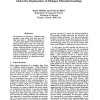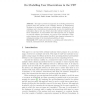303 search results - page 11 / 61 » Unifying Theories of Confidentiality |
FOSSACS
2011
Springer
13 years 1 months ago
2011
Springer
To the best of our knowledge, we characterize for the first time the importance of resources (counters, channels, alphabets) when measuring expressiveness of WSTS. We establish, f...
EACL
1993
ACL Anthology
13 years 11 months ago
1993
ACL Anthology
To respond to an utterance, a listener must interpret what others have said and why they have said it. Misunderstandings occur when agents differ in their beliefs about what has b...
UTP
2010
13 years 8 months ago
2010
This paper presents an approach for modelling interactions between users and systems in the Unifying Theories of Programming. Working in the predicate calculus, we outline generic ...
SIGGRAPH
2010
ACM
14 years 2 months ago
2010
ACM
We develop an accurate, unified treatment of elastica. Following the method of resultant-based formulation to its logical extreme, we derive a higher-order integration rule, or el...
ISAAC
2007
Springer
14 years 4 months ago
2007
Springer
We introduces the umodules, a generalization of the notion of graph module. The theory we develop captures among others undirected graphs, tournaments, digraphs, and 2−structures...


